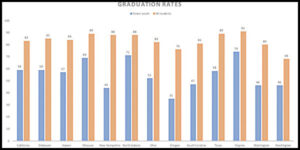How Special Education Is a Prime Example of Our Unhealthy ‘Obsession with Conformity’ in This Week’s AcceliBEAT
February 22, 2019
This week’s round up begins with a look into how special education exemplifies how schools seem to be designed for conformity. They often use behavioral approaches to instruction and intervention for children with disabilities with the intent to reduce “undesirable” behavior and reward and replace those behaviors with more “desirable” ones. In federal news, an individual with intellectual disabilities was denied access to the transplant list and a new report by the School Superintendents Association finds that the Medicaid program needs an overhaul in order to make it easier for more schools to access and use. In other news, a California school district will spend nearly $1 million to offer speech and language lessons for students with special needs by video chat and only 16 states are aligned with ESSA in sharing data on foster care students. All this and more in this week’s AcceliBEAT!
How Special Education Is a Prime Example of Our Unhealthy ‘Obsession with Conformity’
Our education system is an enterprise designed to “fix” children who do not fit the norms of school.
Staff Shortage Forces Special Needs Students in Fresno Unified to Get Speech Lessons by Video
Fresno Unified will spend nearly $1 million to offer speech and language lessons for students with special needs by video chat.
Medicaid Treats Small Districts and Rural Schools Unfairly, Report Says
The Medicaid program—a big source of federal funding for the nation’s schools—needs an overhaul in order to make it easier for more schools to access and use, a group representing superintendents says in a new report.
Feds: Patient with Intellectual Disability Blocked from Organ Transplant List
Federal officials say that a major university health care system will change its ways after denying a person with intellectual disability the opportunity to be placed on a transplant list.
Is your state supporting students in foster care? The answer might be hard to find. “It should not take a degree in statistics or 45 clicks in pursuing an Excel chart to find the answers.”
New Ways to Identify Struggling Students
Five years ago, if teachers or administrators wanted to identify the struggling students they might be missing, they would have had to spend hours combing through spreadsheets, piecing together risk profiles.
Is It Time to Remake Middle School?
Educators and others gathered in Washington, D.C. to discuss ways to “reshape” the perception of early adolescence as a time of risk to one that focuses more on positive opportunities.
Subscribe to Our Newsletter!
Stay informed on upcoming webinars, product updates, best-practice tips, contests and more!
![]()







